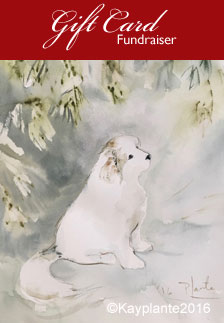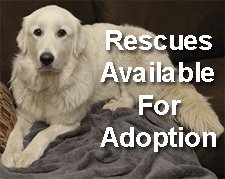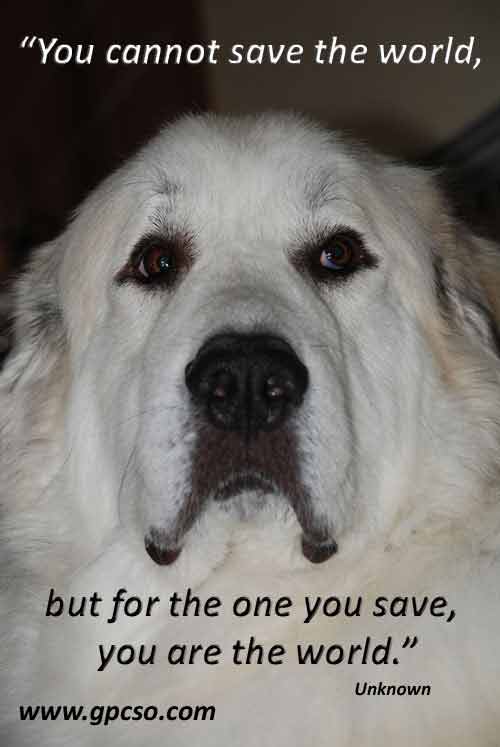Aggression Is Not Part Of The Great Pyrenees Temperament
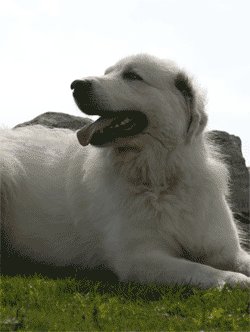
Great Pyrenees temperament is a subject of much discussion. The Great Pyrenees Breed Standard states:
"Temperament: Character and temperament are of utmost importance. In nature, the Great Pyrenees is confident, gentle, and affectionate. While territorial and protective of his flock or family when necessary, his general demeanor is one of quiet composure, both patient and tolerant. He is strong willed, independent and somewhat reserved, yet attentive, fearless and loyal to his charges both human and animal.”
"Although the Great Pyrenees may appear reserved in the show ring, any sign of excessive shyness, nervousness, or aggression to humans is unacceptable and must be considered an extremely serious fault."
A well-balanced, confident Great Pyr is not aggressive, but will be protective of his flock or family when necessary. Confidence in animals as well as people eliminates any need for aggression. So why do we hear of Great Pyrenees Mountain Dogs who are aggressive?
There is no doubt that some Great Pyrs who can be aggressive. Just ask anyone who has done any work in rescuing Great Pyrs. Let’s face it… this is a big, powerful dog that is bred to take control and protect.
But the Great Pyrenees temperament quality we are looking for is confidence… not aggression. How do we prevent Pyr aggression from developing? The simple answer, if there is one, is proper breeding, training and socialization.
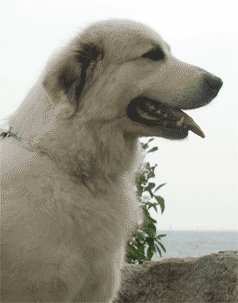
Check out the responsible breeders that are available to you. Quite often you will see references to Great Pyrenees temperament and the attention that is paid to this characteristic in well-bred Great Pyrenees Mountain dogs. For example, the late Lois McIntosh of Limberlost Kennels would say: “Whether my dogs are used for showing, live stock guarding or just a family pet, to my mind, temperament is the most important quality and what I look for above all else.”
But even well-bred Great Pyr puppies with great temperaments can become aggressive Great Pys if not trained and socialized properly by many many different people in their first 13 weeks of life.
The first 13 weeks of the puppies life is critical in the early stages of its development. This is the beginning of learning to be a good canine neighbour. In order for the puppy to go on to continue to be a good canine citizen, this socialization and training is imperative for the next three years.
And what makes a Pyr different from most other dogs? The Great Pyrenees was bred to be responsible for the lives of other living things.
You cannot change the basic nature of a Great Pyr. Any Pyr owner who does not understand this is headed for trouble and should consider another breed that meets their wants. You have to accept the traits you don’t desire to enjoy the ones you do desire. And there are many desirable traits.
Anyone who has lived with a Pyr for any reasonable period of time will tell you about this breed’s amazing ability to sense things that we cannot. A Pyr connects to your soul and reads your emotions and intentions in a way that will amaze you.
This ability to “read” is imperative in the early detection of any threat. It also shows up in how a Pyr selects to whom it will pay special attention, whether animal or human.
To ensure a Pyr receives the best possible start, it needs to be exposed to everything it will be expected to tolerate in its day-to-day life.
A Pyr responds very well to a level of guidance that is gentle and consistent, to learn to accept these things. This is not a task to be treated lightly. But it is a task rich in rewards, one of which is a very special relationship with your Great Pyr.
Do you want your Great Pyr to behave in a way consistent with typical Great Pyrenees temperament? Of course you do! So education is critical.
Great Pyrs are not renowned for their obedience work. That said, to put a label on any breed is to limit your dog's potential.
Great Pyrs respond well to encouragement and positive reward… not so well to aggressive training and punishment. In fact, not well at all and can result in an aggressive dog with its aggression based in fear.
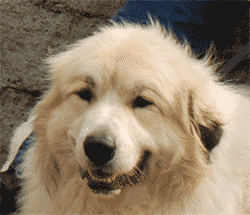
We highly recommend educating your dog through Recallers in order to set your pup/dog up for success. There are also Shaped by Dog videos/podcasts which are excellent resources.
Now that we have covered breeding and training, what’s next?
Socialization is the third leg of this three-legged stool upon which a beautiful, well-behaved, confident, non-aggressive Great Pyr is based.
Once again, this is critical in the first two or three years. A developing Great Pyr be socialized.
Socialization is:
- exposure to different sights, smells and noises;
- exposure to different body handling (cooperative care);
- being neutral around people, dogs and kids;
- maintaining focus in highly distracting environments; and,
- building positive associations with all of the above.
Always have your dog on leash unless you know you have a perfect recall on him/her. Having your Pyr by your side on leash ensures your dog is under control, and prevents the possibility of nasty outcomes if your Great Pyr should encounter an adversary while off leash.
So what do you do with an aggressive Great Pyr?
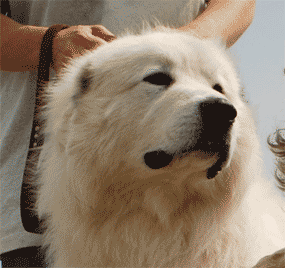
There are a number of things that you do NOT do.
Some folks think that if your Great Pyr is a pet and is aggressive in an urban setting, the solution is to relocate the dog to a farm and give him something to guard.
No! An aggressive Pyr is just as likely to be aggressive towards livestock as it is to people. These are unstable dogs.
The best solution for aggressive Pyrs is prevention. Get your Pyr from an ethical and responsible breeder. One who breeds for sound temperament and health. One who socializes their pups endlessly with many many different people in the first 13 weeks. This must be followed by continuous positive-reinforcement training by their people.
If that commitment is not made consistently, you will have a problem dog. Not happy for you and not for the dog.
Most human aggressive Great Pyrs cannot be rehabilitated. It is not the dog's fault but that of an irresponsible breeder. This is an open letter to the Sheep Farmers of Ontario. Please read.
If you have an human aggressive dog, consult with a certified veterinarian behaviourist who can best assess your dog to see if he can be rehabilitated.
Please read this article on aggression by Patricia McConnell.
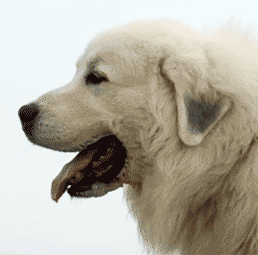
There is no doubt that Great Pyrenees Mountain Dogs are beautiful, intelligent, confident animals. They are also strong, wilful, instinctive guardians.
A well-bred, well-loved and -cared for Great Pyr will reward you with its love, protection and its life if called upon to protect you. It is your Pyr’s bond to you based on a great relationship that makes that happen. Who wouldn't want a dog with a Great Pyrenees temperament?
Remember that a Great Pyr’s job is to protect you or the flock from any and all predators. Wolves, Coyotes, bears… it does not matter. This dog will defend to the death. It takes a very confident, fearless dog to do that job well; and a Great Pyr does it extremely well. It is in his nature and is a requirement for his survival.
Check out this amazing true story.
As you can see from the breed standard describing the Great Pyrenees temperament, we do not want aggression in our breed.
So the challenge is to provide the teamwork, the social conditioning and the necessary positive-reinforcemen training to promote our Pyr’s full potential to develop its natural confidence and poise.
Unfortunately, for Great Pyrs who have not had the proper training and socialization, Great Pyr aggression becomes an unnecessary reality. We wish it were not so.
Want to learn more? Jade Hill knows a thing or two about dogs. She has spent years as a breeder, trainer and nutritionist and has developed a special interest in canine nutrition, canine behaviour and learning theory.
Here's what Jade has to say about
Great Pyrenees temperament and training.
That's it for Great Pyrenees temperament... Let's head for Home
Breaking News
-
Bo
Dec 12, 25 02:22 PM
*ON HOLD* DOB: late Sept 2023 (don’t know for sure) rescued Dec 2023 Location: Acton, Ontario Name: Bo Single dwelling home with a securely fenced -
Courtesy Post - Sarge
Dec 05, 25 10:10 AM
Courtesy Post - Sarge Location: Mount Albert, Ontario DoB: Unknown 2023 Required: He is comfortable around livestock, but he will go as a companion -
Hardy
Nov 25, 25 02:42 PM
Hardy Location: Acton, ON DOB: Approx. January 2025 (we think he is older though) Single-family home required. Minimum 5-foot securely fenced yard. -
Ronnie
Nov 22, 25 06:20 AM
*Adopted* Location: Acton, ON DOB: 9-years-old This big sweetheart went to foster and was soon adopted before we got him posted. From the shelter: -
Lola
Nov 19, 25 12:01 PM
*ADOPTED* A single family dwelling and a securely fenced yard of at least 5 feet are musts. DOB approx: Februay 12, 2021 Location: Acton, Ontario This -
Mayne
Nov 07, 25 04:04 PM
*ADOPTED* (FOSTER FAIL) Mayne Location: Acton, ON DOB: August 5, 2017 (8-years-old) Single-family home required. Minimum 5-foot securely fenced yard. -
Courtesy Post - Remi
Oct 17, 25 11:09 AM
*ADOPTED* Remi (Retriever/Pyr cross) D.o.B: Sept. 30, 2023 Location: Between Owen Sound and Port Elgin (Tara, ON) Remi was given up because of health -
Courtesy Post - Virgil
Sep 30, 25 01:03 PM
*ADOPTED* DoB of Virgil: 2021 (4.5 years old) Reason for rehoming this big white fluffy: Owner has passed away and he is presently living in an apartment.






